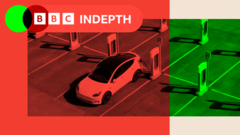33 minutes ago
About sharing
Buoyant electric car sales are a must if we’re to hit our climate targets. But EV sales in the West are down and if governments want them to recover it may have to be at the expense of their own economies.
The numbers
Any motorway driver will know the feeling: you’re cruising along, miles of open road seemingly ahead and then from nowhere, a slowdown.
Something similar has hit the electric vehicle market in 2024. After years of soaring sales, growth appears to be stalling.
Replacing fossil-fuel-powered cars with EVs is central to the UK government’s plan to meet its climate goals – road transport accounting for 12% of planetary emissions.
The question is whether this is a blip that will soon disappear into the rear-view mirror, or is this going to prove more enduring. And if it lasts, will governments have the stomach to do what it takes to keep the net zero show on the road?
We need to buy a lot more EVs to hit climate targets
The growth in EV sales has been remarkable. In 2020, there were 10 million EVs on the road, in 2023 there were 45 million. But sales need to stay remarkable, and the chart below shows just how.
By 2035, the International Energy Agency (IEA) says there will need to be 790 million EVs if we’re to hit net zero by the middle of the century.
That implies growth in sales of 27% every single year.
That’s why the fact that global sales of the world’s largest EV maker, Tesla, were actually lower in the first quarter of 2024 than in the same period in 2023 has raised eyebrows.
China’s largest EV manufacturer BYD has been vying with Tesla for the number-one spot. BYD also saw a slowdown between January and March.
And EV sales in Europe fell more than 10% year-on-year in the final quarter of last year.
People just aren’t sure they’re worth it
In the UK, analysts say strong EV sales in recent years were fuelled by company car purchases, thanks to generous tax breaks.
But the household market is proving a tougher nut to crack, with people saying they are mostly put off by the high cost. The average price of a new EV in the US is over $60,000 (£47,433). Prices are similarly high in Europe and the UK.
Large state subsidies and greater production efficiencies mean the average cost to a Chinese consumer is just $30,000. And BYD’s Seagull hatchback sells for less than $10,000.
China is also making massively more EVs than its domestic market needs – it could easily flood the US and European markets with cheap cars if they weren’t held back by tariffs.
Hard choices at a fork in the road
Here is the dilemma for European and US politicians. They want cheaper EVs to facilitate the climate transition, but not at the cost of undermining their own car manufacturers – the likes of Ford and Volkswagen – and local jobs.
In fact, the talk is actually of raising tariffs and other trade barriers on imports to keep out ultra-competitive Chinese EVs.
More from InDepth
That’s precisely what US President Joe Biden did this week, with a new 100% tariff on Chinese EV imports.
The IEA still projects a sales rise in 2024, which would keep us more or less on track for net zero.
Optimists hope more people will buy EVs when cut-price second-hand vehicles come onto the market in Europe and America. But that clear road is not guaranteed.
It may be that EV prices in the West do prove sticky, while China keeps churning out super-cheap vehicles.
If that happens, expect that tension between the desire of Western governments to decarbonise transport and their desire to protect domestic manufacturing champions to grow even more acute.
At some stage they might be forced to choose.
BBC InDepth is the new home on the website and app for the best analysis and expertise from our top journalists. Under a distinctive new brand, we’ll bring you fresh perspectives that challenge assumptions, and deep reporting on the biggest issues to help you make sense of a complex world. And we’ll be showcasing thought-provoking content from across BBC Sounds and iPlayer too. We’re starting small but thinking big, and we want to know what you think – you can send us your feedback by clicking on the button below.
InDepth is the new home for the best analysis from across BBC News. Tell us what you think by emailing haveyoursay@bbc.co.uk.
Please include a contact number if you are willing to speak to a BBC journalist. You can also get in touch in the following ways:
WhatsApp: +44 7756 165803
Tweet: @BBC_HaveYourSay
Please read our terms & conditions and privacy policy
If you are reading this page and can’t see the form you will need to visit the mobile version of the BBC website to submit your question or comment or you can email us at HaveYourSay@bbc.co.uk. Please include your name, age and location with any submission.
